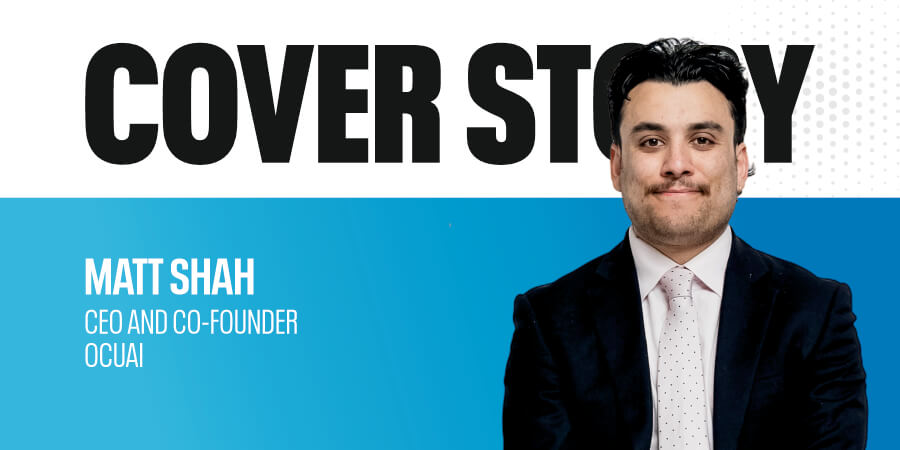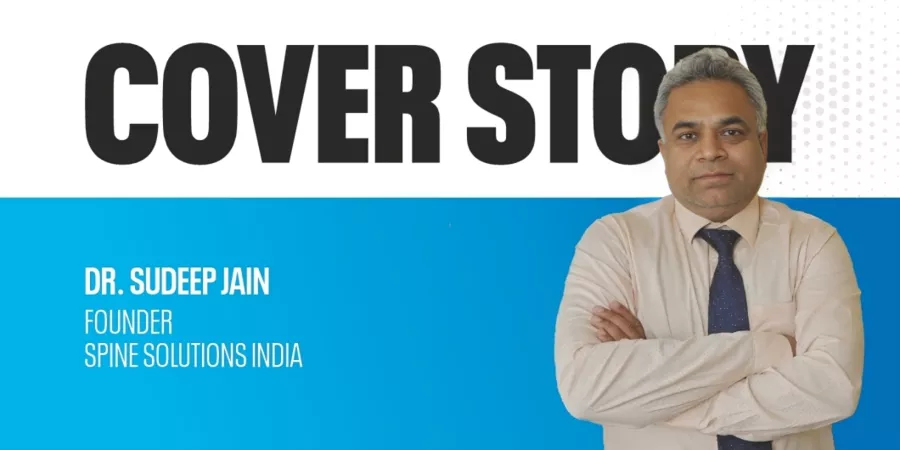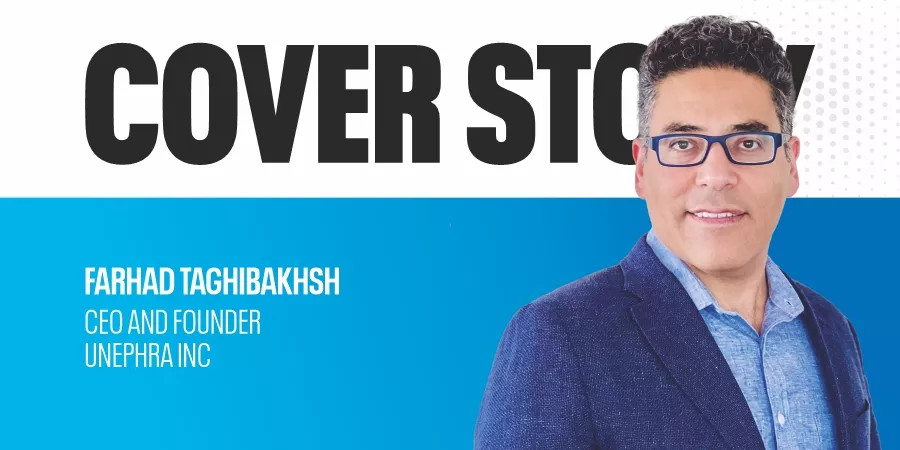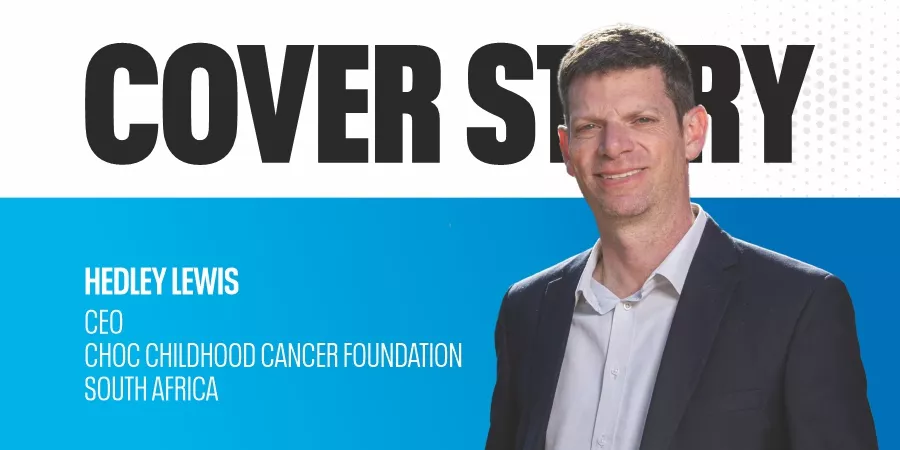Imagine a bustling emergency room where urgency and precision collide, where every second matters, and where decisions shape lives. Yet, outside these critical moments, countless patients endure chronic, life-altering conditions without the same level of attention. In the realm of long-term disease management, leadership calls for innovation, empathy, and a willingness to disrupt the status quo. It’s within this challenging landscape that Matt Shah, the CEO and Co-founder of OcuAI, emerges as a guiding force.
With a broad background, research experience, and a passion for solving real-world healthcare challenges, Matt now leads OcuAI, an innovative healthtech company using artificial intelligence to redefine the glaucoma care pathway, on their journey to create a paradigm shift in the patient management of glaucoma and other blinding diseases.
Matt’s journey into the world of healthtech was unmistakably shaped by a keen sense of observation and a desire to solve pressing problems. Growing up in a medical household, he witnessed firsthand the dual pressures faced by both patients and clinicians: the confusion and anxiety patients endure, and the relentless workload that all medical personnels shoulder. It was a perspective that offered a front-row seat to the complexities of healthcare.
Though he didn’t pursue a medical degree himself, a pivotal experience as a Research Associate on a glaucoma study would become the catalyst for his career. It was during this project that Matt recognized a profound gap in how chronic, sight-threatening diseases like glaucoma were managed. “I decided I wanted to be part of something that could be transformative for patients,” he reflects.
And so, the foundation for OcuAI was laid. With a mission to bridge the gap between clinical expertise and patient access, Matt and his team sought to harness decades of clinical and surgical insights and channel them into a digital platform. The objective was clear: to democratize specialist knowledge, making it accessible to patients while alleviating the burden on clinicians.
“OcuAI is about serving both sides of the equation,” he asserts, “improving outcomes for patients and wellbeing for doctors providing that care.”
Leadership with Precision and Humility
In healthtech, leadership is often associated with relentless drive and authoritative decision-making. Yet, for Matt Shah, effective leadership is not about commanding from the top but listening from the ground up.
“My leadership style is collaborative and mission-driven,” he states.
At OcuAI, Matt is known for leading from the front but with a keen ear for feedback. He actively seeks input from his team, believing that great leadership isn’t about having all the answers but about recognizing when to ask the right questions.
Matt’s approach to leadership is rooted in a blend of personal and professional values. Professionally, he values precision, resilience, and execution. These principles guide OcuAI’s operations, from product development to patient outreach. Personally, he holds humility, curiosity, and integrity in high regard.
“When you combine all these values together, you get a culture and way of working that drives innovation and leads to the best results,” he explains.
It’s a philosophy that informs every aspect of OcuAI’s journey, from the initial conceptualization of their AI-powered tools to their current efforts to democratize access to specialized healthcare guidance. In recognition of his leadership and impact, Matt has been named as one of Business Elite’s 40 Under 40 (Europe) in 2025.
Engineering a Paradigm Shift
Matt believes that currently, the standard glaucoma care pathway is fragmented and reactive. Patients receive just two ten-minute appointments per year, leaving significant gaps in monitoring and education. Matt and his team set out to address this disconnect by leveraging artificial intelligence to provide 24/7 access to world-class specialist information and guidance. “We’re aiming to create a paradigm shift,” Matt explains, “where patients can access the same level of expertise any day, any hour, regardless of where they are.”
Beyond access, OcuAI’s vision extends to equity. Historically, patients from underserved communities have been excluded from critical health information due to logistical and financial barriers. OcuAI is determined to democratize access, ensuring that every patient, regardless of background, can tap into the same resource-rich platform.
“We believe technology should serve both sides of the equation,” Matt asserts. “Improving outcomes for patients and reducing the burden on clinicians.”
OcuAI’s approach is about reshaping the entire care continuum for patients with sight-threatening diseases. Thus, being designed to act as a constant, accessible lifeline in the patient’s care journey.
Reimagining Glaucoma Care
For Matt, the healthcare system’s current structure for managing chronic conditions is a glaring paradox—patients with blinding diseases like glaucoma are often left in the dark, receiving only occasional in-person consultations while living with conditions that demand continuous monitoring and guidance. This gap in care is precisely what OcuAI aims to bridge.
“We’re laser-focused on transforming long-term disease management for patients,” Matt emphasizes. The objective is to shift from episodic, appointment-based care to a model where patients can access world-class specialist information anytime, anywhere. Through OcuAI’s AI-powered tools, patients are empowered to stay connected with their health data, monitor disease progression, and receive tailored guidance on a 24/7 basis.
But the vision extends beyond accessibility to encompasses equity. For decades, healthcare information has remained a privilege reserved for those in proximity to top-tier clinics or those who can afford frequent specialist visits. OcuAI seeks to dismantle these barriers by democratizing education and resources for all patients, regardless of their location or socioeconomic status.
“For too long, patients have been subject to inequity in the information available to them,” Matt asserts. “Through our platform, we’re aiming to ensure that every patient, regardless of background, can access the same guidance and support.”
By redefining glaucoma care as a continuous, data-driven process, OcuAI aspires to not only improve patient outcomes but also reshape how the industry perceives chronic disease management—a mission that is as ambitious as it is necessary.
Confronting Health-Tech’s Triple Constraint
“The basic problem in the healthcare sector is that clinicians do not have three things: time, energy, and space,” Matt explains.
The time issue is particularly stark. There is a significant capacity mismatch between the number of patients requiring care and the number of doctors available to provide it. For many, routine appointments are reduced to mere ten-minute interactions, a model that leaves little room for comprehensive, patient-centered care.
Space is another challenge. Hospitals and clinics are stretched to their limits, lacking the physical infrastructure to accommodate the ever-increasing patient flow. Meanwhile, clinician burnout is at an all-time high, with over 30% of medical professionals reporting regular symptoms of exhaustion. This lack of energy, Matt notes, further compromises decision-making, leading to potential gaps in patient care.
OcuAI is positioned as a solution to these systemic issues. By integrating AI-powered tools into the existing healthcare infrastructure, the platform alleviates the pressure on clinicians, reducing the need for in-person visits and enabling patients to access essential guidance remotely.
“Implementing tools like OcuAI will make healthcare institutions more effective, higher quality, and with better outcomes,” Matt asserts. The objective is not to replace human expertise but to extend it, creating a hybrid care model that blends clinical acumen with digital efficiency.
As OcuAI continues to refine its offerings, the company remains steadfast in its mission to not only support patients but also to empower the very clinicians on whom the healthcare system depends.
A Hybrid Tomorrow
Matt strongly believes that the future of healthcare is about merging human expertise and technological advancements into a cohesive, hybrid model of care.
At OcuAI, this philosophy underpins every product and service they develop. By enabling continuous monitoring, data analysis, and patient education, AI serves as an ever-present extension of clinical expertise, ensuring that patients receive timely guidance even outside of scheduled appointments.
“What excites me most is how these technologies will help close equity gaps,” Matt notes. In traditional care settings, patients in rural or underserved communities often lack access to specialist care. By providing AI-driven support remotely, OcuAI levels the playing field, making essential information and monitoring accessible to all.
Yet, Matt is careful to emphasize that technology alone is not a panacea. The human elements—empathy, intuition, and nuanced clinical judgment—remain irreplaceable. “AI and digital therapeutics in particular won’t fully replace doctors. But they have the potential to radically alter the care pathway and structure,” he explains.
Falling in Love with the Problem
For those chasing excellence in a landscape that’s evolving at a breakneck speed, Matt’s advice is strikingly simple: fall in love with the problem, not the solution.
“Identify the problem you want to fix and fall in love with that, not necessarily the solution,” he emphasizes.
This philosophy has been the driving force at OcuAI. Throughout the development process, Matt and his team have remained anchored to addressing the significant gaps in glaucoma care.
“Throughout this entire process, we have been through multiple iterations and changes to develop the product and the tools,” he reflects. “What has stayed the same is the problem we are aiming to fix.”
For Matt, the problem is clear: patients with blinding diseases are not receiving consistent, continuous care due to the fragmented nature of traditional healthcare systems. By focusing relentlessly on this gap, OcuAI has been able to adapt, pivot, and refine its offerings without losing sight of its core mission.
Milestones on the Horizon
Looking ahead to 2025 and beyond, Matt Shah is steering OcuAI toward a series of strategic milestones aimed at expanding the platform’s impact and solidifying its position as a leader in glaucoma care.
The first significant marker on the horizon is the pre-seed funding round. “We’re currently in the early stages of raising the round,” Matt shares. This crucial step will provide the necessary capital to further develop OcuAI’s MVP and roll it out for early patient testing.
For Matt, this funding phase will bring the opportunity to refine the platform, integrate user feedback, and validate the technology’s effectiveness in real-world settings. The goal is to transition from concept to tangible impact, enabling patients to access specialist guidance and continuous monitoring outside of traditional clinical settings.
Beyond the MVP rollout, Matt has ambitious plans for OcuAI’s long-term trajectory. “Longer term, we’re really excited to build out the full holistic end-to-end management tool,” he reveals. This comprehensive suite will encompass every aspect of patient care, from initial diagnosis to ongoing management, ensuring that patients receive consistent, accessible support throughout their treatment journey.
Expansion into new geographies is also on the roadmap. As OcuAI scales its platform, Matt envisions reaching underserved patient populations in regions where specialist care is limited or inaccessible. “We’re aiming for wider-scale adoption and expansion out into new geographies in the coming years,” he states, underscoring the company’s mission to democratize access to critical healthcare resources.
As OcuAI continues its journey, the milestones ahead are not just about technological advancement; they represent Matt’s broader vision of transforming glaucoma care, one patient at a time.





